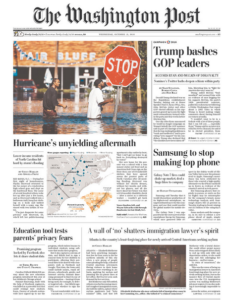Our concerns about the open-ended data sharing of the  Summit/Facebook software platform was featured on the front page of today’s Washington Post. This software is in 100 schools nationwide, about two thirds of them public schools. The list is here. Two of the schools are in NYC: the Bronx Writing Academy in District 9; and J.H.S. 088 Peter Rouget in District 15 in Brooklyn.
Summit/Facebook software platform was featured on the front page of today’s Washington Post. This software is in 100 schools nationwide, about two thirds of them public schools. The list is here. Two of the schools are in NYC: the Bronx Writing Academy in District 9; and J.H.S. 088 Peter Rouget in District 15 in Brooklyn.
Summit is sharing the student personal data with Facebook, Google, Clever and whomever else they please – through an open-ended consent form that they have demanded parents sign. A copy of the consent form is here.
I have never seen such a wholesale demand from any company for personal student data, and can imagine many ways it could be abused. Among other things, Summit/Facebook claims they will have the right to use the  personal data “to improve their products and services,” to “conduct surveys, studies” and “perform any otheractivities requested by the school. ”
personal data “to improve their products and services,” to “conduct surveys, studies” and “perform any otheractivities requested by the school. ”
Here is an excerpt:
Summit may collect information that you provide or your child provides directly to Summit, such as contact information, coursework, testing, and grades. Summit also may collect information automatically from browsers, computers, and devices (such as information from cookies and browser and device identifiers in order to remember your preferences)….. Summit may use your child’s information to conduct surveys and studies; develop new features, products, and services; and otherwise as requested by your school or consistent with your consent. … Summit also may disclose information to third-party service providers and partners as directed or authorized by the school. For example, Summit uses Clever, Facebook, and Google to help develop and improve the personalized learning plan software or to provide related educational services on Summit’s behalf.
They claim they won’t use the child’s personal data for targeted ads (as would be banned anyway in the CA law called SOPIPA) but this is among the only restriction. They say they can sell the data “in connection with a corporate transaction, such as the sale of our Services, a merger, consolidation, asset sale.” The one-sided Terms of Service is here; the Privacy Policy is here.
The Summit platform has never been independently vetted for security protections – or shown to yield any educational benefits, and I believe is a very radical way to outsource instruction and student data to private companies.
Other reasons that teachers as well as parents should be concerned:
The Terms of Service claims the right to use the intellectual property  of teachers in these schools, including course assignments, etc. and even student work without any recompense: “You Grant Us a non–‐exclusive, perpetual, transferable, sub–‐licensable, royalty–‐free, worldwide License to use content that you post on or in connection with the Services in any manner, media, form, and modes of uses, now known or later developed.”
of teachers in these schools, including course assignments, etc. and even student work without any recompense: “You Grant Us a non–‐exclusive, perpetual, transferable, sub–‐licensable, royalty–‐free, worldwide License to use content that you post on or in connection with the Services in any manner, media, form, and modes of uses, now known or later developed.”
–Though I’m not an attorney, the Terms of Service seems to explicitly and repeatedly waive any liability that Summit or FB or any of its partners may have for protecting the data against breaches, complying with state or federal law, or abiding by their own Terms of Service;
— As the Washington Post article points out, the TOS would force any school or party to the agreement (including teachers) to give up their right to sue in court if they believe their rights or the law has been violated, and limits the dispute to binding arbitration in San Mateo CA – in the midst of Silicon Valley, where Facebook and Google presumably call the shots. This is the same sort of abuse of consumer rights that that banks and credit card companies have included in their TOS and that the federal Consumer Financial Protection Bureau is now trying to ban.
–The CEO of Summit charters, Diane Tavenner, is also the head of the board of the California Charter School Association, which has aggressively tried to get pro-privatization allies elected to California school boards and state office, and has lobbied against any real regulations or oversight to curb charter school abuses in that state.
– – Summit says they won’t sign individual contracts with school districts or schools, for the following ostensible reasons, and suggests a legal loophole for states and districts that require such contracts:
Summit Public Schools is unable to sign contracts, MOUs, or other legal documents from other districts, CMOs, or individual schools. Straying from our Summit Partnership contracts would add immeasurable risk to our organization as we are unable to acquire third party validation on different contracts in the way that we did for our own participation agreement. It would not be legally sound for us to enter into two legal contracts with two sets of potentially conflicting commitments for one program.
Some districts that have policies where all third party vendors need to sign one designated contract were able to bypass that requirement given the status of Summit Public Schools as an educational organization rather than a vendor and the nature of the partnership as a free exchange of ideas and services rather than a paid service relationship.
And then they add – presumably to assuage the fears of parents or school administrators:
In order to ensure that our legal agreement meets the high quality demanded by school organizations across the U.S., Summit Public Schools has gone the extra mile to work with one of the best legal teams in the country to draft this agreement. We worked with Jules Polonetsky – CEO of the Future of Privacy Forum, a Washington, D.C.-based think tank that seeks to advance responsible data practices – and his team to review our privacy policies and provide his 3rd party stamp of approval. Straying from the language in our participation agreement would add risk as we are unable to also acquire third party validation on different contracts.
What they don’t reveal is that the Future of Privacy Forum is largely funded by the technology industry and the Gates Foundation, and Polonetsky was a big supporter of inBloom. (Nevertheless, the sample contract they apparently offered to Kentucky schools did not include the binding arbitration clause, though it limits Summit’s liability to $10,000.)
For these and other reasons, I think parents and students should be VERY concerned.
In my view and that of many other parents, the explosion of ed tech and the outsourcing of student personal data to private corporations without restriction, like this current Summit/Facebook venture, is as risky for students and teachers as the privatization of public education through charter school expansion. In this case, the risk is multiplied, since the data is going straight into the hands of a powerful charter school CEO – closely linked to Gates, Zuckerberg and Laurene Powell Jobs, among the three wealthiest plutocrats on the planet.
Gates has praised Summit to the skies, has given the chain $11 million, and has made special efforts to get it ensconced in his state of Washington; Zuckerberg is obviously closely entrenched in this initiative, and Laurene Powell Jobs has just granted the chain $10 million to launch a new charter school in Oakland.
I sent the following list of questions to Summit at info@summitbasecamp.org nine days ago, but have received no response. Others — especially parents at these schools and/or privacy advocates — might like to send their own questions or resend mine as well. And if you are a parent or a teacher at one of these schools, please contact me ASAP at leonie@classsizematters.org Thanks! Leonie
Questions for Summit:
- 1. What is Summit’s definition of “reasonable and comprehensive data protection and security protocols to protect student data”? What does that specifically include in terms of encryption, independent audits, security training, etc? And where is that in writing?
- 2. If my child’s data does breach, what rights would I have as a parent to secure damages?
- 3. Does Summit claim unlimited rights to share or utilize my child’s homework and intellectual property without notice or compensation that they are claiming with teacher work in the TOS?
- 4. Can Summit specifically itemize the companies/organizations that they will share my child’s data with, aside from those mentioned below?
- 5. Are each of these third parties barred from making further redisclosures of my child’s data?
- 6. Are each of these third parties, and any other organizations or companies or individuals they redisclose to, legally required to abide by the same restrictions as listed under your TOS and PP, including being prevented from using targeted or non-targeted advertising, and/or selling of data, and using the same security protections?
- 7. Does Summit promise to inform parents over the course of the year all the additional third parties the company plans to disclose my child’s data to?
- 8. What is the comprehensive list of personal data Summit is collecting and potentially sharing from my child? You mention a limited list below, but does it also include my child’s homework, grades, test scores, economic status, disability, English proficiency status and/or race as well?
- 9. The TOS mentions survey data. Is there any personal data from my child that Summit promises NOT to collect via a survey or otherwise? Will parents have the right to see these surveys before they are given and opt out of them, or does signing this consent form basically mean a parent is giving up all their rights under the PPRA?
- Why can’t Summit simply give the software platform to schools to use if it is beneficial, along with links to instructional materials, rather than demand as “payment” in the form of all the student information as well?
1 11. Do you promise not to use the information gained to market products directly to students and/or their parents, and are all your partners and/or those they disclose the information to barred from doing so as well?
1 12. The PP says you will use my child’s personal data to develop new educational “products” – what does that mean? Why can’t you use de-identified data for this purpose?
- It also says you will use this data to “communicate with students, parents, and other users.” What does that mean? What kind of communications will you engage in with my child or with me?
- The PP states a parent can “review, correct or have deleted certain personal information”. Which kind of personal information can I delete, how will I be able to do that and will that stop my child from using the platform?
1 15. The PP also says you will share the data with anyone “otherwise directed or authorized by the school.” What does that mean? Does my signing a consent form mean that the school can authorize to share this information with ANYONE else, without specifying the sort of third party, for what reason, or without limitation, without informing me or asking for my further consent?
1 16. It says it will send notice of proposed changes to the PP ahead of time to the participating schools; why not parents if you have their contact info? Shouldn’t they hear this directly from you and immediately if you are considering changes?
- Does Summit consider this parent consent form to mean that parents are waiving the privacy rights of their children under all three federal student privacy laws, including FERPA, COPPA and PPRA?
1 18. The PP says that “FERPA permits schools to share students’ information in certain circumstances, including where the school has gotten a parent’s’ consent or where the organization receiving the student data operates as a “school official.” Summit Public Schools operates as a “school official” consistent with the Department of Education’s guidance under FERPA.” If this is true, why does Summit need to ask for parental consent? What additional rights does my consent afford Summit that you would not have without consent in terms of the collection, use and disclosure of a student’s personal information?
- Summit says that “Participating schools and individual teachers own, and are responsible for, student data provided through the Summit Personalized Learning Platform.” Why don’t students own their own data?
- This raises another related question: the Summit Privacy Policy and Terms of Service grants schools and teachers some rights (however limited.) What rights do parents and students have under these conditions?
- The TOS says that if schools believe Summit has violated its promises or complied with the law, instead of suing they must submit to binding arbitration in San Mateo CA and are barred from filing class action complaints. This type of provision has been heavily criticized when banks and credit card companies have included in their consumer agreements, and the Consumer Financial Protection Board is considering restricting their use. Why is this clause any more acceptable in your TOS?
- What legal recourse do schools, teachers or parents have if Summit violates the law or its TOS, for example if Summit decides to sell or give away or carelessly store the data given that the TOS says “UNDER NO CIRCUMSTANCES, INCLUDING WITHOUT LIMITATION, NEGLIGENCE, WILL SUMMIT, ITS AFFILIATES, OR ANY PARTY INVOLVED IN CREATING, PRODUCING, OR DELIVERING THE SERVICES BE LIABLE FOR DAMAGES OR LOSSES” in any case?
- In yet another clause of the TOS, Summit requires schools to “agree to indemnify, hold harmless, and defend Summit, and its affiliates, licensors, and service providers, and each of their respective officers, directors, contractors, agents…etc.et. against any and all demands, claims, liabilities, judgements, fines, interest, penalties… etc. including attorneys’ fees etc.” Why the need for so many layers of self-protection and disclaimers of liability?
- What rights does a parent have in general if Summit violates the TOS or the PP? Are they bound to the binding arbitration clause in the TOS that the school must agree to?
- In another FAQ here, Summit says that it will not sign contracts or written agreements with individual school districts, and if the state requires this under law, districts or schools should try to “bypass that requirement” by claiming that a) Summit is not subject to the law because it is not a “vendor” but an “educational organization” and b) that they should not have to sign a contract because of the “nature of the partnership as a free exchange of ideas and services rather than a paid service relationship.” But if you are gaining potential economic and programmatic benefits from your access to student data, including using it to build new and better “products” as the TOS states, why isn’t this a commercial relationship bound by state law? And if this relationship is truly a “partnership” with a free exchange of ideas, why is the TOS so one-sided and seems to protect Summit from any possible liability, and not the school?
